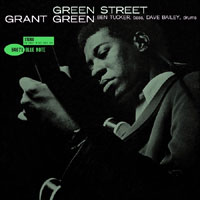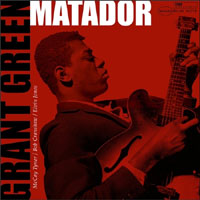Grant Green • Green Street
Grant Green • Matador
nce again I’m holding in my hands a couple of new releases from Music Matters, and once again a big smile has crossed by face. It seems that Ron Rambach and his team have hit upon a formula for success and are determined to continue it. These two titles are among the second dozen, cut at 33rpm, the label has mined from the vital Blue Note Records vault. Up this time are two sessions featuring the much-underappreciated guitarist Grant Green. His style heavily influenced by Charlie Christian and Charlie Parker, he was Blue Note’s house guitarist and the label’s most-recorded artist, with over a hundred albums in his discography -- thirty of those as leader. He was also versatile -- musically at home playing bebop (Born To Be Blue), blues (Stop and Listen), gospel (Feelin’ the Spirit), funk (Live at the Lighthouse), Latin (The Latin Bit) and, much to the dismay of jazz purists, Billboard Hot 100s (Easy), in settings from trio to full orchestra. In one particular year he appeared on over twenty albums either as a leader or a sideman. Green Street was originally released in the early 1960s; Matador was recorded in 1964, but it languished in Blue Note’s vaults until 1979, when it was released in Japan with different cover. That original King pressing has become a pricey collector’s item. It wasn’t until 2010 that Music Matters released Matador as a two-LP, 45rpm set. Out of print now, it too has become expensive. As I stated in an earlier review, the vinyl coming from Music Matters represents the current state of the art -- from the perfectly flat, clean, eerily quiet RTI-pressed vinyl to the heavyweight, acid-free, high-gloss Stoughton Printing Co. gatefold jackets, there is nothing I can find fault with. The sound is beyond reproach too, and the exquisite black-and-white photos adorning the inside of each gatefold add icing to a very sweet cake. Three of the five tunes on Green Street are Grant Green compositions, and the opener, "No.1 Green Street," is one of them. It’s a straight-ahead, 4/4, funk-infused blues, showcasing the trio, Green’s no-nonsense approach to the music, and the sound he coaxes from his Gibson ES-330 hollow-body guitar and, most likely, a Fender Tweed Deluxe amp with the bass and treble attenuated, so the midrange is turned up. That sound, lovingly characterized by Dave Hunter in a 2008 Gibson guitar blog as ". . . silky, rich and alive" with "a crispness and edge to each note" and "a plummy, slightly rubbery attack" is beautifully captured in typical Rudy Van Gelder style in this early stereo recording. Green is hard left, bassist Ben Tucker is center right and drummer Dave Bailey is hard right. You are in the studio with the musicians and the slight hint of reverb establishes a just-right, club-like atmosphere. It was refreshing to hear, courtesy of Tucker, a fine, well-articulated walking bass solo recorded with finesse by Van Gelder. Thelonious Monk’s "’Round About Midnight" finds Green walking on eggshells as he approaches the famous melody. Bordering on the lethargic, his is a lovely introspective, brooding interpretation and showcases his hornlike approach to the music. The subtle reverb created such a dreamy atmosphere that I found myself getting lost in the music, almost nodding off due to the relaxing sound. Another Green original, "Grant's Dimensions," has a catchy, blues-tinged theme leading into solos by Green and Tucker. Again, Green is outstanding in his ability to shift the tonality of the guitar in certain phrases. Toward the end of the tune there is effective trading of fours between Green and Bailey, who provides Rock of Gibraltar stability and metronomic drive to the proceedings as he propels the music forward. Side two’s opener, "Green with Envy," is another Green original, with the guitarist’s Mercurial, punchy, biting tone captured beautifully. Green’s bop sentiments are everywhere on this album, but surfacing every now and then is a unique turn of phrase or harmonic giant step, heard in particular on this tune. Tucker again takes a fine solo, and Green and Bailey trade eights, carrying on a tradition as old as jazz. A loping approach to the album's closer, Arthur Schwartz’s '30s jazz classic "Alone Together," finds Green in a mellow mood as he seemingly hand-picks each note. Once again, a hint of reverb contributes to the atmosphere of the song. Matador finds the guitarist in a quartet setting with half of John Coltrane’s great quartet: pianist McCoy Tyner and drummer Elvin Jones. Their presence on this session inspired Green tremendously and helped push this album to critical acclaim -- it is considered among Grant Green’s greatest recordings. For an archetypal recording of a guitar-driven quartet, look no further than the leadoff tune, "Matador," a Green original clocking in at 10:51. Because there are only four songs on the album, each tune leaves ample space for the musicians to stretch out, and Green and Tyner each do so, contributing fine, definitive solos. As expected, Elvin Jones drives things along with almost maniacal drumming. Is that print-through or someone grunting along with the beat? Turns out it's Jones’s guttural grunting. A reimagined "My Favorite Things" follows, keeping true to Coltrane’s definitive version on the Atlantic LP of the same name. Green is exceptional here as he retraces the tenor giant’s steps on his guitar’s six strings. Everyone shines on this tune, with Tyner and Jones pushing the music forward with drama and passion. I could almost visualize Coltrane’s presence in the studio, lending an air of authenticity to the proceedings. Side two opens with "Green Jeans," another Green original. It’s a jaunty, catchy tune in non-standard meter featuring flowing, lyrical solos by the guitarist and Tyner, the former’s tremolo-laden, plummy tone much in evidence here. Elvin Jones again contributes some idiosyncratic drumming. A Duke Pearson original, "Bedouin," ends the side. It’s another longish modal piece brimming with drama, polyrhythmic quirkiness and an Eastern vibe. Using his guitar like a horn, Green again lays down another fine, linear, single-note solo over the insistent drumming of Jones and tasteful comping of Tyner, who demonstrates in his solo why he was Coltrane’s pick as a sideman. Raising the volume during Elvin Jones’s largely snare-and-tom-tom solo puts you in Van Gelder’s New Jersey studio, where the presence is so palpable you feel as if the drum kit is only a few feet away. Unlike some of Grant Green’s later recordings,
you’ll not be dancing along to either of these. Instead, you’ll be listening to
one of the '60s most overlooked musicians whose voice was silenced way too soon. These
albums are essential for admirers of modern jazz guitar. |



